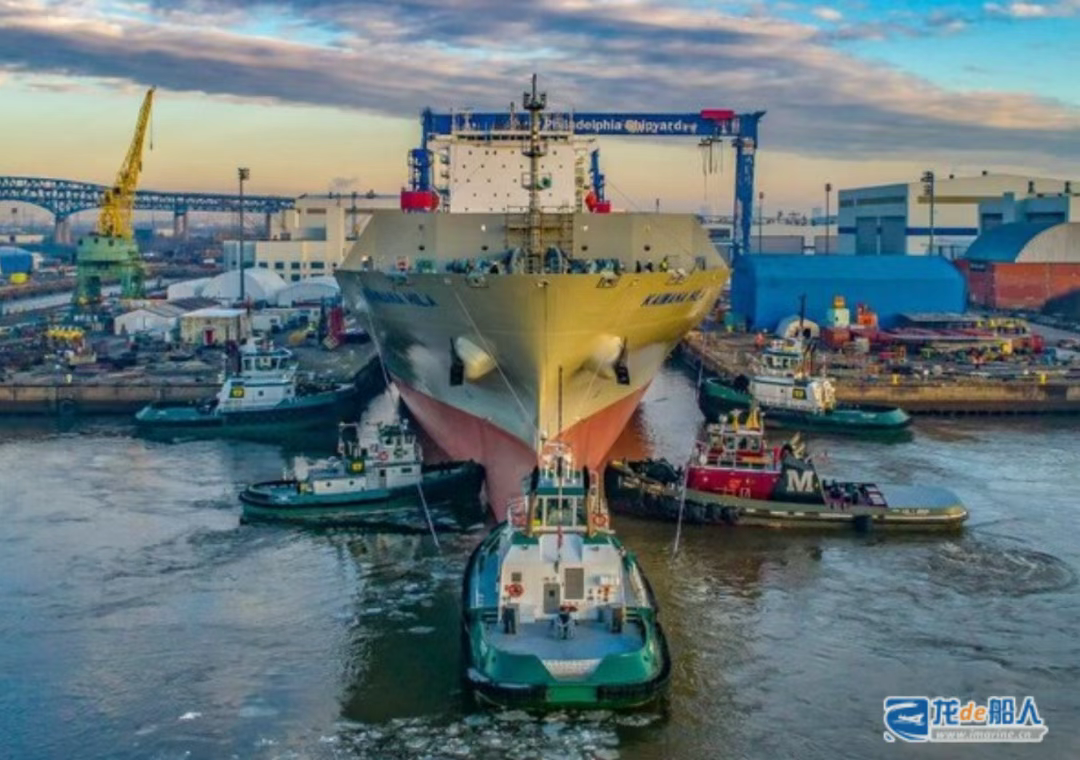South Korean shipbuilders’ aggressive push into the U.S. shipbuilding industry has been dealt a heavy blow. Hanwha Philly Shipyard (formerly Philly Shipyard) was collectively sued by local workers for alleged wage arrears.

Shipyard faces class action lawsuit over unpaid overtime
Recently, Hanwha Philly Shipyard was collectively sued by local workers for alleged wage arrears. The case involving Hanwha Philly Shipyard was initiated by Irene Rivera, a former employee who worked at the shipyard. The core of the case involves allegations of wage arrears affecting hundreds of workers, with the amount at least reaching US$5 million.
According to the lawsuit, Irene Rivera, while working part-time at Hanwha Philly Shipyard, was required to wear protective gear and walk to work each morning, waiting in advance for morning meetings. The plaintiff claims the shipyard failed to consider these “necessary activities” before and after work as work time. These activities, which took dozens of minutes each day, were also counted as “unpaid work” for any hours worked over 40 per week, resulting in no overtime pay.
He believes that Hanwha Philly Shipyard’s actions clearly violate Pennsylvania’s Minimum Wage and Hour Act (PMWA), and has therefore filed a lawsuit on behalf of approximately 100 former, current, and part-time employees of the shipyard, including himself.
According to relevant laws and regulations, overtime pay of 1.5 times per hour should be paid for work exceeding 40 hours. However, because the company consciously excludes “unpaid work” when calculating the 40-hour working week, many employees fail to receive overtime pay.
“All time spent performing work-related activities expressly directed by the company should be considered ‘work time,’” the plaintiffs allege in their lawsuit. “We allege that the company’s prevailing wage policies and attendance record-keeping system violate state law.”
Transfer application accepted and heard by Federal Court
The wage lawsuit against Hanwha Philly Shipyard was initially filed in the Pennsylvania state court (Philadelphia County Court), but the defendants filed a Notice of Removal requesting that the case be transferred to federal court. The federal court has accepted the request and has confirmed that it will formally hear the case.
The court ruled that the case met the criteria for acceptance under the Class Action Fairness Act (CAFA). CAFA is a federal law enacted in 2005 that stipulates that federal courts may directly hear class action lawsuits, even if they were initially filed in state courts, provided that certain conditions are met.
Hanwha Philly Shipyard filed a motion for transfer based on three grounds: first, there was “minimum diversity” among the parties involved—although the shipyard is a Pennsylvania corporation, some of the workers involved in the lawsuit were confirmed to reside in other states; second, the number of parties involved in the lawsuit exceeded 100, meeting the requirements of CAFA; and third, the amount of the claim exceeded $5 million.
The court accepted the above argument and ruled that “given the scale of the case and the legal issues involved, it is appropriate for the case to be heard at the federal level.” As a result, the case will no longer be heard by the state court, but will be formally transferred to the U.S. District Court for the Eastern District of Pennsylvania for trial.
First major legal dispute for South Korean shipbuilders entering the U.S. market
Through this motion to transfer the case, the defendant Hanwha Philly Shipyard first resolved the issue of jurisdiction. As a result, the following issues will become the core points of contention in the subsequent proceedings: the definition of unpaid wages, policy consistency, whether there was intent, and the legitimacy of the company’s refusal to pay.
Hanwha Philly Shipyard clearly stated in its application documents: “This proceeding only involves jurisdiction consolidation and does not constitute an admission of liability or wrongdoing related to this case. All legal defenses will be exercised during the trial.” This move foreshadows a fierce court battle between the two sides.
This case may become the first large-scale legal dispute encountered by South Korean shipbuilders entering the U.S. shipbuilding market. In particular, this case is the first class action lawsuit filed against Hanwha since it acquired the Philly shipyard in December last year, and is therefore of great symbolic significance.
The plaintiff pointed out in the lawsuit documents: “At the end of 2024, when Hanwha acquired the Philly shipyard from Norway’s Aker ASA, the legal name had already been changed from ‘Philly Shipyard’ to ‘Hanwha Philly Shipyard.’” As South Korea’s shipbuilding industry becomes more active in investing in the US, such labor risks may also increase.


